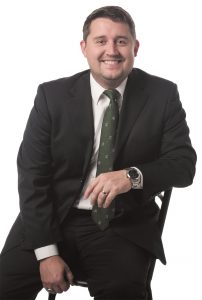Subscriber Benefit
As a subscriber you can listen to articles at work, in the car, or while you work out. Subscribe Now
Jacob German
Barnes & Thornburg LLP
Indiana University Maurer School of Law, 2014
Why did you decide to enter the legal profession?
I grew up in a household of educator parents — my parents were public school teachers. Consequently, early in my life they instilled a lifelong commitment to education and learning. My dad taught government, and I remember being very curious about how the government operates, specifically the structure, role and ultimately whether I agreed with actions taken by the government. At Wabash College, that morphed into a study that focused on the interaction of private business and government and the continuous back-and-forth of regulations and policy decisions in that space. Eventually, I decided to enter the legal profession because I wanted to participate in the development of policy and advocate for clients — people, businesses and positions — for my profession.
If you hadn’t pursued a legal career, what would you be doing?
Golf course design. If the late Pete Dye turned me down, I would enjoy any profession that would afford me the opportunity to interact with people — college professor, coach, sales representative, public relations specialist.
Who is someone who has inspired you in your career?
Bob Grand and Brian Burdick have been and continue to be huge inspirations in my career. Bob, along with Mike Lucas, really built the government services practice at Barnes & Thornburg, and we are still bearing the fruits of that work today. It took great vision and tenacity to recruit the right personnel and fight for work around the state. Brian is the champion of practice development and practice management. He’s one of the firm’s great leaders but also manages an ever-growing practice. Both Brian and Bob have encouraged me to observe their different styles and approaches to the practice while also developing my own path.
What’s the best advice you’ve ever received?
Life is all about managing expectations, especially your own. For some reason, that concept really struck me and continues to impact the way I approach my professional and personal life.
What makes a good lawyer/judge?
I think the idea of a “good lawyer” really boils down to a well-prepared, fierce advocate. Clients, at the end of the day, really want someone in their corner who will dig in when things get tough and fight on their behalf.
How do you spend your free time?
My wife and I just welcomed our first child, so as parents all over know, any free time I have I spend with him. Beyond that, I love old movies — classics like “Casablanca,” “White Christmas” and “To Catch a Thief,” to name a few. I’m also an avid golfer and try to play whenever I can.
If you were an animal, what would you be?
Lion.
Which superpower would you rather have: invisibility or the ability to read minds?
Read minds.
How did you get into government law?
During my first year of law school, I started working at the Indiana Gaming Commission for Adam Packer doing regulatory compliance and policy development in the casino industry. From there, I worked as a summer associate at Barnes & Thornburg focusing a great deal of my time on municipal law, public finance and state procurement. The rest is sort of history.
Tell us about your work with the Bill Cook Foundation.
The Bill Cook Foundation seeks to help some of the world’s poorest children get the best education possible. The founder, Bill Cook, was my professor at Wabash College. During those years, he led students (including myself) to various foreign countries in search of memorable educational experiences, always with a focus on helping humanity. When he started the foundation, I asked to serve as a member of his board of advisors and continue to assist the foundation’s expansion efforts. Today, the foundation has ongoing projects in Ethiopia, Kenya, Laos, Myanmar, Papua New Guinea and Cambodia.•
Please enable JavaScript to view this content.
